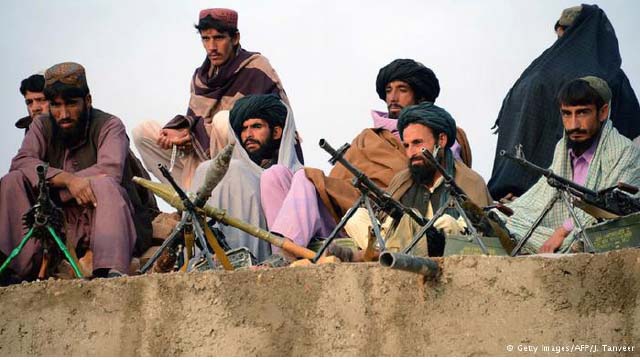Afghan nation suffers from political instability and there is a sense of fear and despair in the air. Militancy continues unabated. The wall of mistrust between nation and state has grown high. A great number of Afghan people cross the border to flee the insecurity.
“At the moment 40 percent of terrorists who are fighting against us are those who have been released from our own prisons. Those who have released these terrorists from our prisons must apologize to the nation.” These words were spoken by Afghan Chief of Army Staff General Shah Shahim. He might have alluded to the release of the Taliban militants during Karzai’s presidency. As a result, more than 500 prisoners have been freed from Bagram Prison by the decree of Afghan ex-president Hamid Karzai. The repeated release of terrorist, mainly a group of 88 “dangerous prisoners”, drew the condemnation of Afghan MPs and led to tension between Kabul and Washington. Although, Karzai sought to persuade his “discontented brothers” through his generous act to sit on the table of negotiation, nonetheless he failed to reap a fruitful result within the last decade of his administration.
The Afghan government decided to hold negotiations with Taliban militants as a mechanism to end terrorism. President Karzai constantly called on the Taliban to join the peace process. In late 2008 he even offered to provide security for the Taliban supreme leader, Mullah Omar, if he agreed to peace talks – this was not incentive enough.
On June 18, 2013, Taliban opened an office as the first move towards peace deal after 12-years of fighting, but it enraged Afghan President by styling itself as an unofficial embassy for a government-in-exile. Mr. Karzai raised his concerns about the peace process not being Afghan-led. He suspended plans for Afghan officials to meet the Taliban in Qatar. His concerns were so great that US Secretary of State John Kerry had to promise that the Taliban flag and their sign reading “The Islamic Emirate of Afghanistan” would be removed. The flag remained, albeit on a shorter flagpole.
The US President Barack Obama’s administration supported peace talks with the Taliban after the US-led forces lost ground against the militants across Afghanistan.
The reconciliation process, which failed during Karzai’s administration, continued up to the establishment of National Unity Government (NUG). The rift between Kabul and Washington was bridged as Afghan President Ashraf Ghani signed Bilateral Security Agreement (BSA) – what Karzai held out against it despite Loya Jirga’s agreement and persistence of US officials. Similarly, Pakistan hosted a face-to-face talk between Afghan officials and Taliban representatives for the first time in the hill resort of Murree near Islamabad on July 07, 2015 in what was described as an ice-breaker aimed at ending the 14-year-old conflict. Pakistani, US and Chinese officials also took part in that meeting, which ended with a resolve to continue the dialogue. The discussion was concluded with an agreement to meet again after the Muslim fasting month of Ramadan.
However, the revelation of Mullah Omar’s death – which was kept secret for two years – on July 29 stalled the talk. On top of this, Mullah Akhtar Mansour’s appointment as Omar’s successor was changed into a controversial issue and led to splinter group. Following the appointment, Mansour held out against peace negotiation and intensified the terrorist offensive in Afghanistan so as to gain further support. A number of terrorist networks’ heads endorsed Mansour in a session held in Pakistan and called the splinter group to pledge allegiance to him as a legitimate leader.
Subsequently, a sense of mistrust resurfaced between Kabul and Islamabad. In the wake of escalated attacks and Taliban’s open session in Pakistan, Afghan high-ranking officials, including the President and Chief Executive Officer Dr. Abdullah Abdullah, charged Pakistani officials with insincerity. The tension disrupted the reconciliation process and Afghan authorities denied Pakistan’s mediation stating to initiate an Afghan-led talk. Recently, Pakistani officials re-push Afghanistan to resume peace talk with the Taliban elements and assert that negotiation is the only way for bringing peace. In a visit to the Unites States, Pakistan’s Army Chief General Raheel Sharif focused on reconciliation process about Afghanistan.
China urges both the countries to bury the differences and orchestrate peace talk with mutual cooperation. A Chinese Foreign Ministry spokesperson stated with a sense of delight that an agreement is brokered between Afghanistan and Pakistan on Monday to promote the Afghan peace process with “legitimate political actors” and take action against those who hold out to join the peace process. The understanding was reached at a meeting between President Ashraf Ghani and Pakistani Prime Minister Nawaz Sharif on the sideline of the Climate Change Conference in Paris, reports say.
Allegedly, Omar’s successor Mullah Akhtar Mansour was wounded or even killed in the past days over a reported infighting between Mansour’ s supporters and opponents near the southern Pakistani city of Quetta – the claim which was rejected by the Taliban. “Local media, citing a former Taliban leader Mullah Amir Khan Mutaqi, has reported the death of Mansoor on Thursday,” local news said. It is believed that if Mansour has been died in the clash, the peace talk will be procrastinated once more – such cases have always posed impasse to peace negotiation. Hopefully, Afghan government will pay serious heed to security crisis, China will broker the Afghan-Pak tie and Pakistan will break the stalemate through nudging the Taliban elements to sit on the table of a genuine negotiation. In short, regional cooperation in promoting peace talk plays a key role in the country and sincerity is highly integral in continuing relations.

